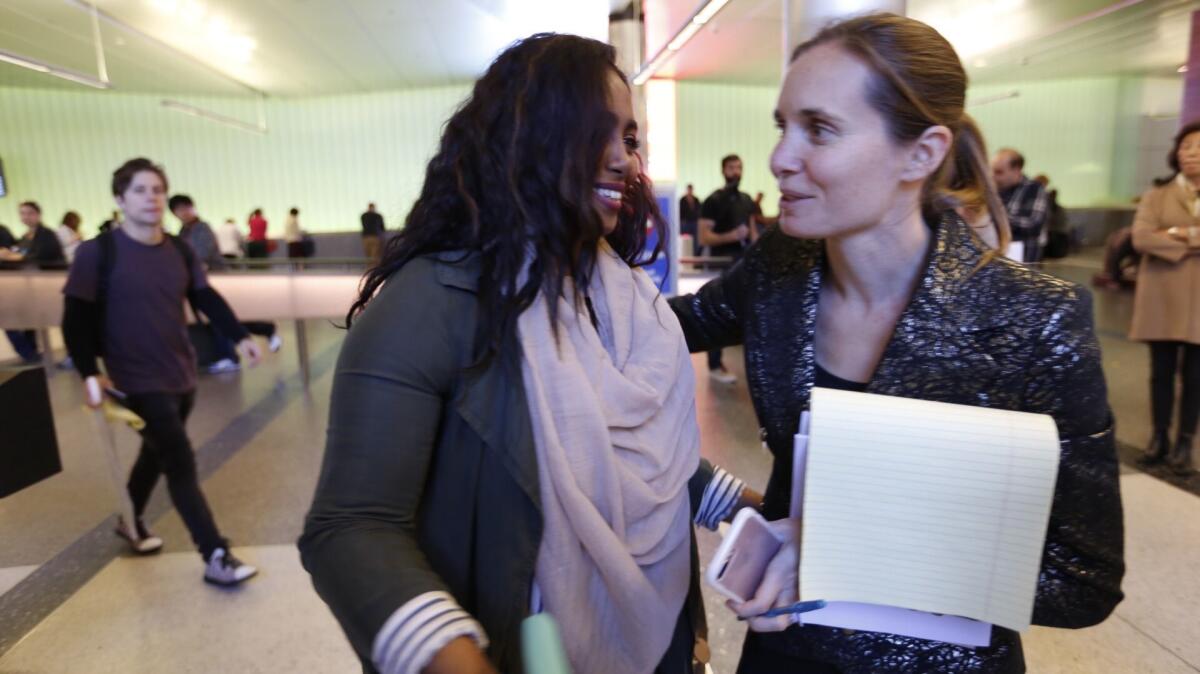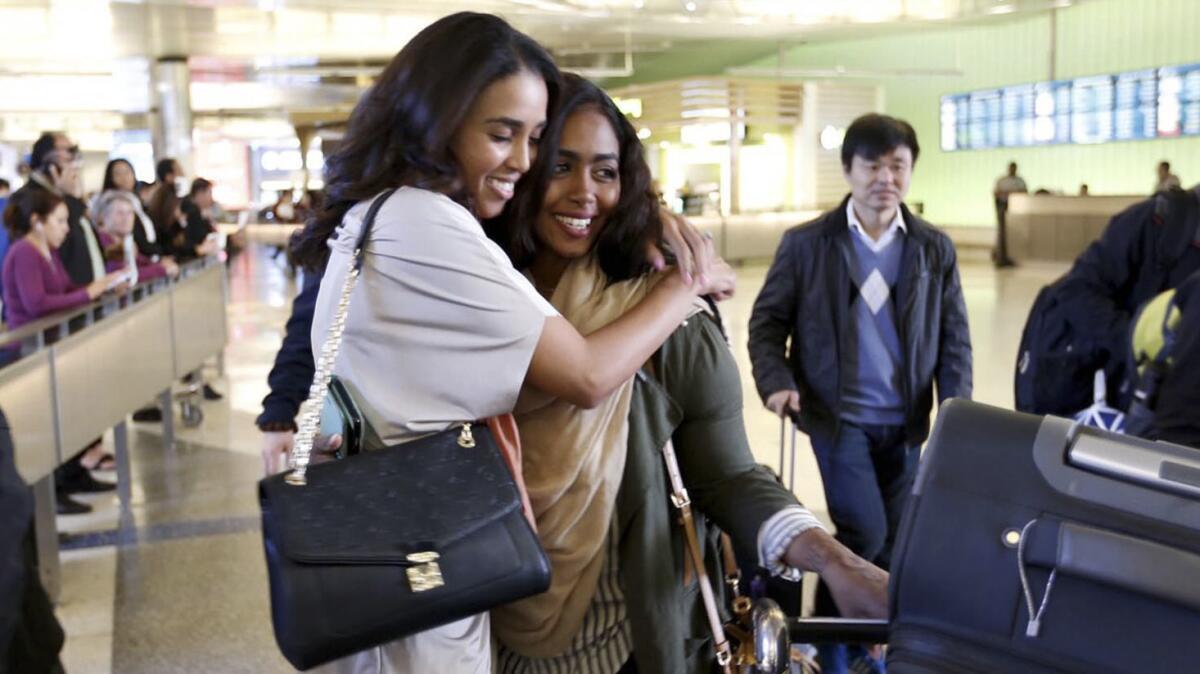‘Coordinated chaos’: Scores of volunteer attorneys mobilized to try to stop detentions and deportations at LAX

- Share via
As the sun set Friday, attorney Talia Inlender shut down her mobile phone and computer for the Jewish Sabbath.
The electronics were supposed to remain off until the next night, but President Trump had just signed the executive order barring refugees and citizens from several Muslim-majority countries from the United States. Inlender’s wife awoke her the next morning after reading news reports of the sweeping ban.
“I think you need to turn on your phone,” she recalled her wife saying.
Scanning her emails, Inlender saw an emergency plea from a refugee assistance organization asking for attorneys to help people being detained by border officials at U.S. airports. Within hours, Inlender, an immigration lawyer who works for the nonprofit Public Counsel, was walking into the Tom Bradley International Terminal at Los Angeles International Airport.
She was among the first in what would become a wave of volunteer lawyers descending on the airport in the wake of Trump’s order. Many, like Inlender, are part of a battle-tested network of advocacy groups in Los Angeles that has been working for years without fanfare on immigration issues and now have suddenly found themselves in the international spotlight as they push back against the president’s action. Others were attorneys with no experience in the intricacies of immigration law who felt compelled, nonetheless, to turn out as their social media feeds filled with calls for help.

“It was coordinated chaos,” Inlender said of the response.
Indeed, veteran advocates and attorneys who tried to organize the outpouring of help described a frenetic, largely improvised effort that was thwarted badly by Customs and Border Protection officials who refused to allow attorneys to see people being detained and released no information on the detainees.
The executive order, which Trump has claimed will better protect the country against terror attacks, bans refugees from any country entering the U.S. for 120 days and bars refugees from Syria indefinitely. It also blocks citizens from seven Muslim-majority countries for at least 90 days. Critics of the ban have expressed concern it will do little to improve security while alienating Muslims.
As details of the order began to leak out last week, lawyers and organizers said they held conference calls to discuss the legal challenges they planned to mount once the order was signed. Inlender said she responded to an email from one nonprofit, the International Refugee Assistance Project, that sought volunteers for a legal rapid response team should the need arise.
But several immigration lawyers said they were still caught off guard by the scope of the order. White House officials initially said it applied as well to people with green cards, which give them legal status as residents in the country.
That decision stunned lawyers. As reports of legal residents and refugees being detained at airports began to surface Saturday morning, emails between advocacy groups were flying and phones ringing, said Stacy Tolchin, an attorney who chairs the National Immigration Project for the National Lawyers Guild.
“This is a grassroots effort,” cautioned one email that went out Saturday morning soliciting help. “We’re trusting you to coordinate with your fellow local attorneys, and to keep us informed if anything goes awry.”
By mid-morning dozens of lawyers had been dispatched to LAX. The numbers grew over the weekend and by Monday more than 100 attorneys had showed up, estimated Judy London, directing attorney of Public Counsel’s Immigrants’ Rights Project.
One of them was Steve Sina, who was quick to admit he doesn’t know much about immigration law. The Playa Vista-based attorney, who normally handles cases involving technology and transactions, drove to LAX Monday after reading news reports of the prolonged detentions and deportations of people that continued after federal judges in Los Angeles and elsewhere issued emergency stays against the executive order.
“Today was really a no-brainer,” he said. “Federal judges orders are not being followed, are being disrespected.”
Sireen Sawaf got involved through a Facebook post.
A former law school classmate of Sawaf’s alerted her to a friend’s post on Saturday, asking for the names of Arabic-speaking attorneys to help at LAX.
“I had been incessantly reading the news,” Sawaf said. “When I saw that tag, I thought, ‘This is an opportunity to do something.’”
She canceled her plans to see friends on Sunday, leaving her two young children with her husband as she made her way to the airport. When she arrived, she walked up to a group of attorneys who had already assembled.
“I can speak the language. I’m Syrian. I’m an attorney,” she said. “I’m not an immigration attorney but heck, I read a couple documents and I have a sense of what we can demand and I can help.”
Sawaf, who works for the city attorney’s office in Los Angeles, said she felt a personal connection to the work. Her parents are Syrian, and her family immigrated to the U.S. from Japan when she was a toddler, after her father got a work visa.
Although her parents are now citizens, Sawaf said, she has other relatives who are not. The travel ban “can and will affect my family personally.”
A handful of volunteer attorneys showed up on Monday at the U.S. Marshals office in downtown Los Angeles, hoping unsuccessfully that the agency would help enforce orders by various judges to temporarily halt the president’s action.
“I’m self employed, so anytime I’m not working I’m losing money — this is just much more important,” said Darius Amiri, 34, an immigration attorney whose father emigrated from Iran in the 1970s.
Another of the lawyers, Nina Bonyak, 33, said she fled Russia in 1992 after the collapse of the Soviet Union, where she and her family were persecuted as Jews. She came to the U.S. at age 9 as a refugee with her parents, sister and grandparents.
“My family ran away from a Communist country to get away from these kinds of things,” said Bonyak, a naturalized U.S. citizen. Bonyak and Amiri had spent the day before at LAX looking for relatives of detainees.
If there’s a silver lining to all this, it’s that it turns out Americans care about refugees — and their lawyers.
— Attorney Talia Inlender
Inlender and others who were the first to arrive at the airport over the weekend set up an impromptu command post next to a bar and a Pinkberry frozen yogurt store in the Bradley Terminal. Someone showed up with markers and poster board, and signs in Persian and Arabic were drawn up offering help.
With authorities denying access to people being detained, lawyers were left to canvass the arrivals area of the terminal in search of relatives who were waiting for people being held. Those family members, some of whom were able to speak by phone with their detained loved ones, relayed information to the attorneys. Those details were relayed in turn to Tolchin and attorneys from the American Civil Liberties Union, who were at their offices frantically writing court filings based on some of the cases to challenge the order.
With scores of lawyers on hand eager to help, it was an often a frustrating experience, lawyers said, as there was little actual legal work to do. On Sunday, with the cadre of lawyers still swelling, London ultimately announced to the group that the most helpful thing they could do was join the mass of protesters that had gathered outside the terminal.
Still, London and others said they were heartened by the turnout and the support that airport travelers and others showed. A steady stream of pizzas, hamburgers and bottles of water were delivered to the attorneys throughout the weekend.
“I’ve been doing this work for 30 years and haven’t been able to get people to pay attention,” London quipped. “If there’s a silver lining to all this, it’s that it turns out Americans care about refugees — and their lawyers.”
Times staff writers Maya Lau and Kate Mather contributed to this report.
alene.tchekmedyian@latimes.com
For more breaking news in Southern California, follow us on Twitter: @JamesQueallyLAT, @joelrubin and @AleneTchek
ALSO
Trump fires acting attorney general for refusing to defend legality of his refugee ban
Despite heavy secrecy, portraits emerging of those detained at LAX under Trump order
Facing Trump’s immigration ban, corporations can’t risk keeping silent
More to Read
Sign up for Essential California
The most important California stories and recommendations in your inbox every morning.
You may occasionally receive promotional content from the Los Angeles Times.
















